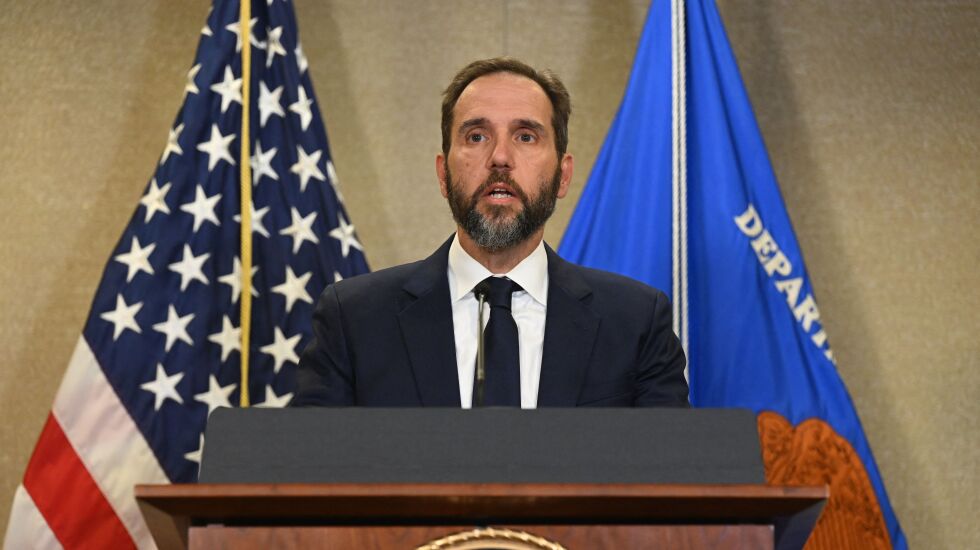
If you want to know why Special Counsel Jack Smith went directly to the Supreme Court this week, look at the calendar. Smith is asking the high court to state what ordinarily would be beyond doubt: That a president who tries to steal an election by lies, intimidation, violence and the abuse of official power can be prosecuted.
But Smith’s challenge has less to do with this legal question and everything to do with the clock. To understand why, we need to understand how weak former President Donald Trump’s immunity claim is and how it relates to his overall legal strategy.
Smith is seeking the high court’s review of Judge Tanya Chutkan’s decision on Dec. 1 that former presidents have no sweeping immunity from the criminal process. Trump’s claim of immunity is not unfamiliar. Back in 1977, then-former President Richard Nixon pithily expressed the same view to a British journalist when he said, “Well, when the president does it, that means that it is not illegal.”
Like Trump, Nixon had tried to use his official powers to retain his office through unlawful means. And Trump’s claim to immunity, like Nixon’s, stands on vanishingly thin ice.
There is no provision in the Constitution that explicitly, or implicitly, supports Nixon’s (or Trump’s) claim. This is not because the framers of the Constitution didn’t know how to create immunities from criminal process. To the contrary, they explicitly included language in Article I that gave federal legislators a narrowly carved immunity in the Speech and Debate Clause.
Judges should be leery of assuming the framers took care when fashioning narrow legislator immunity — but then somehow also secretly gave presidents an amorphous and open-ended license to violate the criminal law.
Judges also look to historical practice as evidence of the Constitution’s meaning. History, however, is of limited use here. The question of what to do when the president violates the criminal law and then is indicted hasn’t arisen before.
Neither Congress nor the Court has taken a clear view on the matter. To the extent that English legal history speaks to the question, the trial and execution of King Charles I is a salient example. As precedent, it hardly helps Trump.
Legal precedent doesn’t help ex-president
Of course, this Supreme Court has made clear it can be impatient with inconvenient precedent and it is willing to press the law suddenly in unexpected directions.
One possible argument is the Constitution creates impeachment for presidential misconduct, making it a necessary precondition to an indictment. But impeachment extends equally to presidents, other officials and judges.
So if presidents can’t be criminally prosecuted without being impeached first, neither can representatives or judges. Yet no one suggests the Justice Department goes awry when it presses charges against, say, George Santos — and for good reason.
Another imaginable argument is the Supreme Court has recognized a presidential immunity from damages that extends to both present and former office-holders, and this should now be extended to criminal actions. But this doesn’t help Trump either.
For one thing, civil immunity is limited to the president’s official actions, as the D.C. Circuit recently affirmed. Many of the allegations in Smith’s indictment fall outside any plausible view of official presidential responsibilities.
For another, the main justification for civil immunity is a worry that presidents are such high-profile targets for private suits that they will be overwhelmed. This is not a concern with federal criminal actions, which rest in the sole prerogative of the government. Finally, the government interest in a criminal case is arguably far stronger than a private litigant’s interest in getting damages.
The question of Trump’s immunity from criminal prosecution shouldn’t be a hard one for the court. But then, the reason for Trump’s legal team to press the issue isn’t really related to its legal merits.
The strategy of Trump’s criminal defense team has been to repeatedly press for delays that would push any trial until after the election, with the implicit hope that Trump prevails at the polls. He could then direct prosecutors to drop federal charges and invoke the White House as a shield against state criminal prosecutions.
Indeed, were Trump to win the presidency in November 2024, it seems extremely unlikely any criminal process could move forward.
By seeking expedited review in the Supreme Court, Smith is anticipating and addressing the most potent source of delay. The success of his strategy may well have generations-long repercussions for the integrity of our democracy.
Aziz Huq is the Frank and Bernice J. Greenberg Professor of Law at the University of Chicago Law School. His most recent book is “The Collapse of Constitutional Remedies.”
This op-ed is published as part of “The Democracy Solutions Project,” a partnership among the Chicago Sun-Times, WBEZ and the University of Chicago’s Center for Effective Government to examine critical issues of democracy as the 2024 election approaches.
To submit a letter to the editor or op-ed, check out our guidelines
The views and opinions expressed by contributors are their own and do not necessarily reflect those of the Chicago Sun-Times or any of its affiliates.







